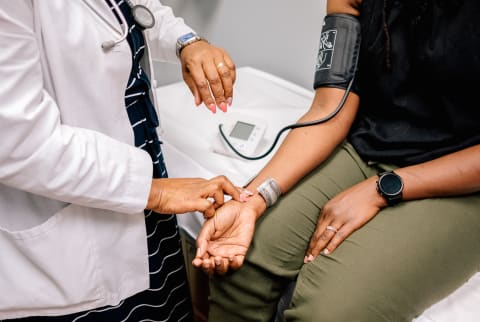Advertisement
What Heart Patients Need To Know About COVID-19, From An Expert


We get it, social distancing can be rough. You miss your friends and your sense of normalcy. But staying at least 6 feet away from others is the most important precaution we can be taking right now to prevent the spread of COVID-19. The guidelines are put in place, not only for ourselves but for the more vulnerable populations—including people with cardiovascular disease.
We reached out to interventional cardiologist and medical director of Abiomed, Shon Chakrabarti, M.D., MPH, who explained the increased risk factors people with heart disease might face and how people with the preexisting heart conditions can stay healthy in isolation.
What are the risk factors for people with heart disease?
Most people with heart disease fall into the same category of those at higher risk for severe illness from COVID-191, including elderly age, history of heart failure, high blood pressure, or diabetes.
"If nothing else, it's another reason to adhere to the measures everyone should be taking," Chakrabarti told us. "They should be practicing social distancing and, if symptomatic, contacting their doctor for next steps."
Because of their preexisting conditions, though, there are extra measures heart patients should be taking right now.
1. Get at least 30 minutes of cardiovascular exercise a day.
While everyone should be prioritizing movement right now, patients with a history of heart disease should maintain cardiovascular exercise, at least 30 minutes per day.
"Optimally, you would find places to walk outside," he said. "Getting sunshine, fresh air, and seeing people—even at a distance—can be good for your mental health." If you live in a city that makes it difficult to get outside without breaking social distancing guidelines, there are plenty of creative ways to exercise indoors.
Online workout classes are an option, as well as yoga and stretching. In extreme cases, Chakrabarti said climbing up and down the stairs or walking and jogging in place can help elevate the heart rate.
"The important thing is to keep moving," he said. "For patients with heart disease, spending all day in a sedentary position is just about the worst thing you can do."
If you're working from home, take your calls while standing up or find a tall dresser within your home to use as a standing desk. "It does require being creative," he said, "but keeping active doesn't necessarily require expensive equipment."
2. Have an extra supply of your heart medication.
"A lot of cardiologists are increasing telemedicine visits," Chakrabarti said, "but many offices are not prepared for this. As a result it may be hard to see your cardiologist for a routine visit."
He encourages patients to call their physicians to figure out an appropriate supply of heart medications. A standard supply may be 30 days, but "a 90-day supply is reasonable right now," he said. "For certain lifesaving medications, even six months might be reasonable."
3. Take care of your mental health.
"It's very well proven that mental stress has a tangible effect on the heart," Chakrabarti said. "A lot of the things we've discussed can go a long way in managing that."
Aside from exercising and spending time outside, he said maintaining human contact can have de-stressing effects.
"Thankfully, we live in 2020 and have a lot of technological ways to do that," he said. "It can be a phone call, a video call, or an online forum." However you choose to keep in touch, make it a priority.
Taking time to slow down, breathe, and put things into perspective can also help manage anxiety. "We're going through a crisis, and that's undeniable," he told us. "But there is a light at the end of the tunnel." He reminded us to focus on the positive things that are happening as a result of being quarantined.
"All of a sudden I'm playing board games with my little kids, we're reading books together, and we're waking up every day and having breakfast as a family," he said. "These sorts of things that might've fallen by the wayside are now back in the American lifestyle." Try to find your silver lining.